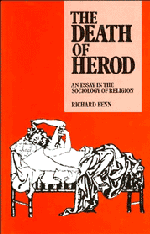Book contents
- Frontmatter
- Contents
- Acknowledgments
- Introduction
- 1 Two methodological viewpoints: the priestly and the prophetic
- 2 Description, interpretation, and explanation: modes of analysis
- 3 Levels of observation and of analysis: making the right choices
- 4 “What is going on here?” The role of the observer and the beginnings of theory
- 5 The search for useful concepts: evil and charisma
- 6 The making of a theory
- Epilogue
- References
- Author index
- Subject index
- Index of biblical citations
5 - The search for useful concepts: evil and charisma
Published online by Cambridge University Press: 07 January 2010
- Frontmatter
- Contents
- Acknowledgments
- Introduction
- 1 Two methodological viewpoints: the priestly and the prophetic
- 2 Description, interpretation, and explanation: modes of analysis
- 3 Levels of observation and of analysis: making the right choices
- 4 “What is going on here?” The role of the observer and the beginnings of theory
- 5 The search for useful concepts: evil and charisma
- 6 The making of a theory
- Epilogue
- References
- Author index
- Subject index
- Index of biblical citations
Summary
REVIEWING THE ARGUMENT: SUCCESSION CRISES BREED DREAD AND DESPAIR
In this chapter I wish to expand on the question, “What is it like to live in a society that is suffering from a crisis in succession?” That crisis, as we have seen, affects the choice of “The king of the Jews”: a title with which Pilate honored, however mockingly, the messianic figure from Galilee. In so doing Pilate gives us an additional reason for thinking that the crisis of succession and the choice of a legitimate “king of the Jews” was still endemic and unresolved in Israel three or more decades after the death of Herod. The crisis in succession also affects the relation of one age-set to another, that is, of sons to fathers, and thus raises issues about the meaning or necessity of sons “being about their fathers' business.”
As I argued in chapter 1, the succession in a patrilineal society must go smoothly if that society is to continue to believe in its ability to own and control the sources of life. If the society in question is going to reproduce itself, sons must succeed fathers, and kings-designate must succeed the former ruler. That process of reproduction occurs, however, in many spheres: in the fertility of the fields, in the deference of the young to the old, in success in hunting or in agriculture, in mining or in manufacture, in the martial or in the fine arts.
- Type
- Chapter
- Information
- The Death of HerodAn Essay in the Sociology of Religion, pp. 132 - 156Publisher: Cambridge University PressPrint publication year: 1992



